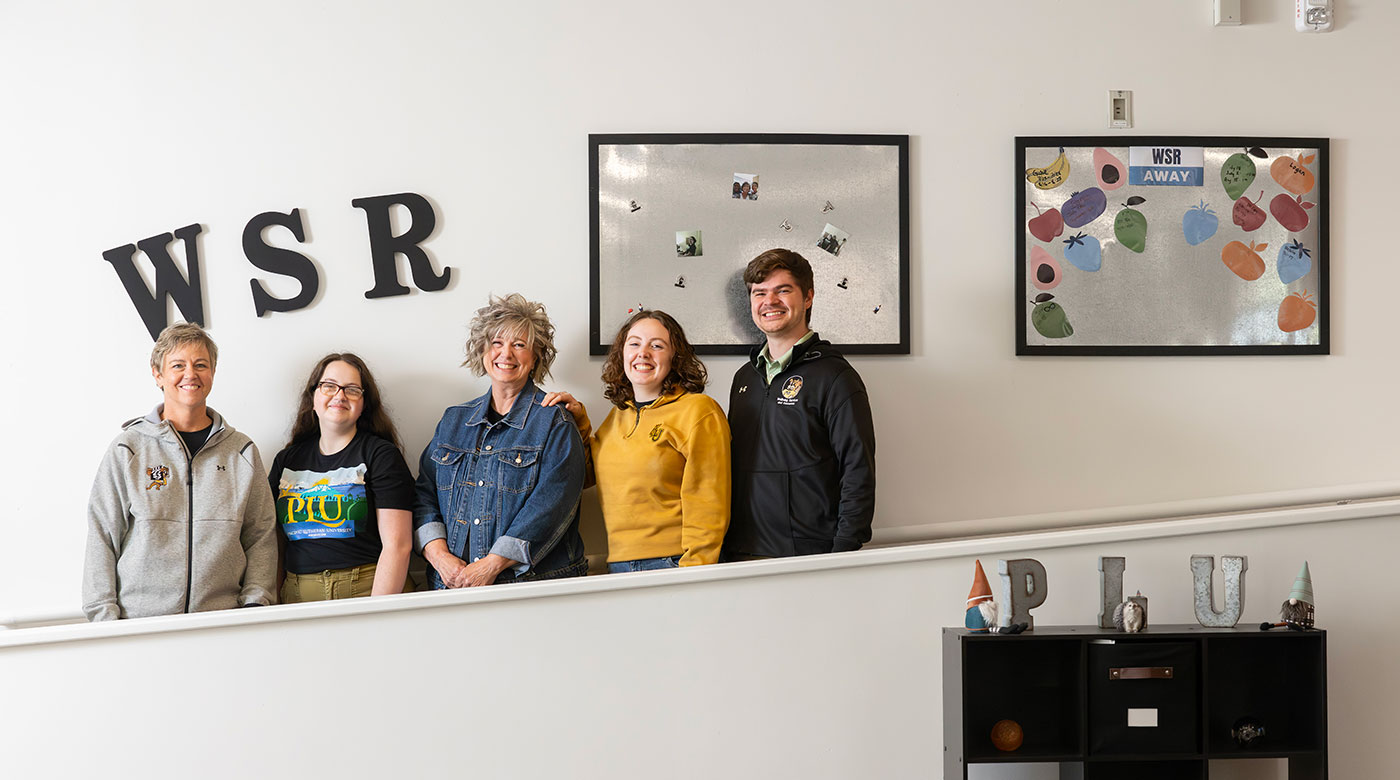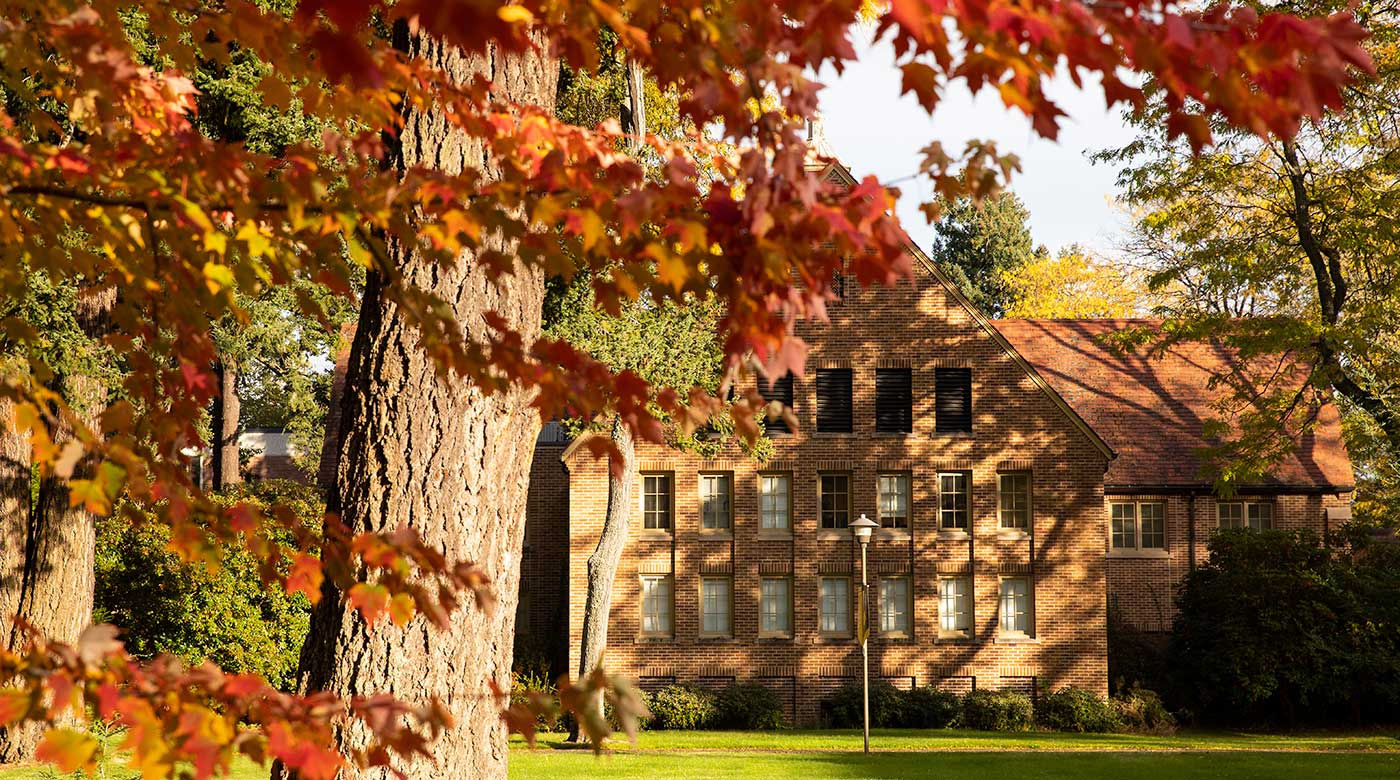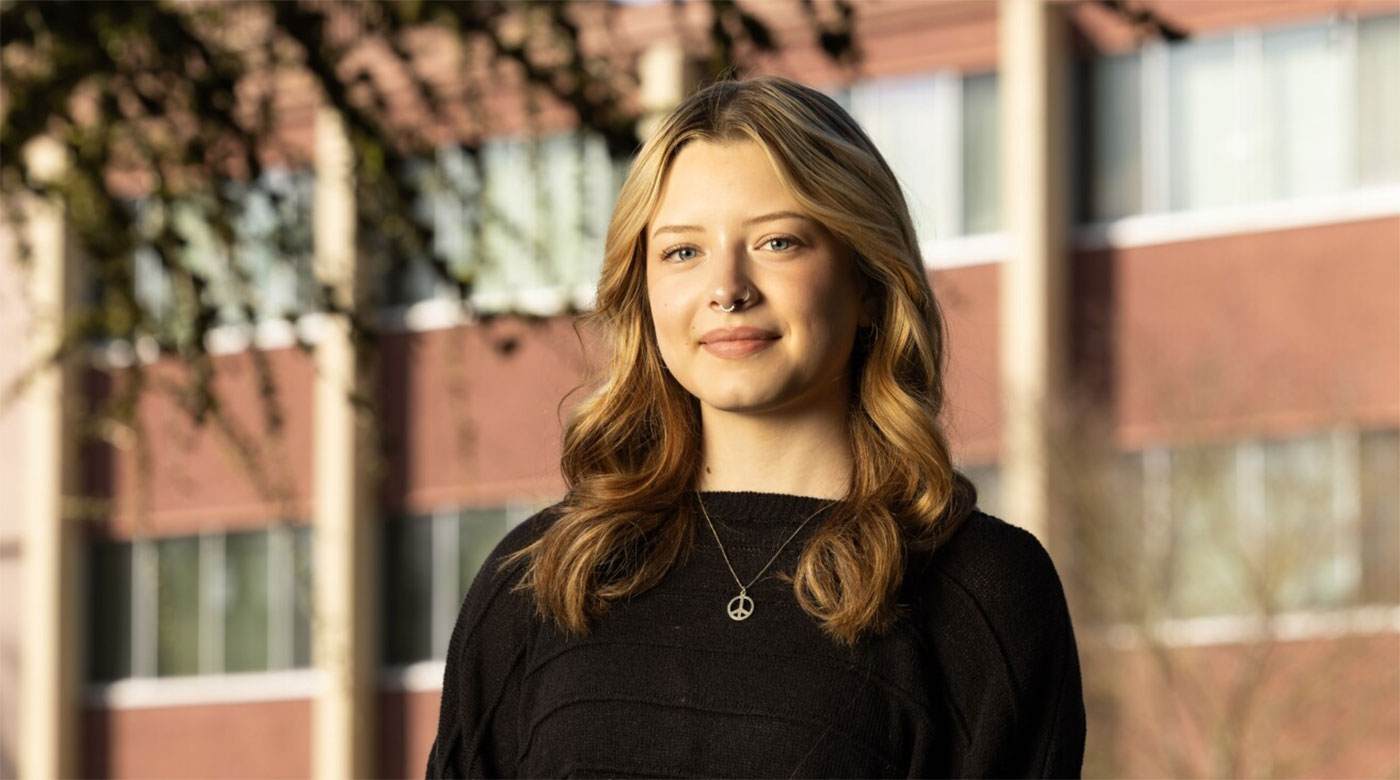How I built my life while fighting for it
My cancer story and the people who helped me through it
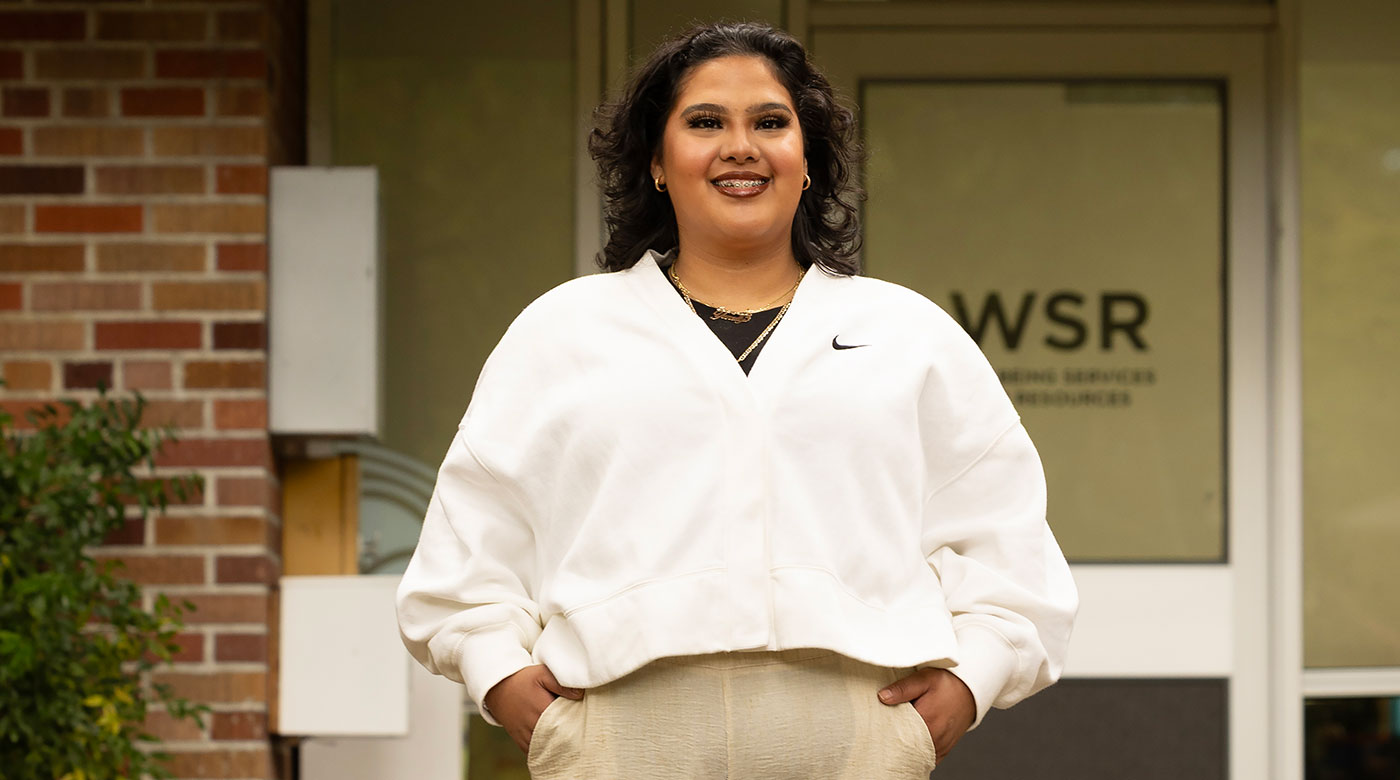
Image: Yanelly Gurrola Anaya ’25 for the 2025 Fall issue of Resolute. (PLU Photo / Sy Bean)
By Yanelly Gurrola Anaya ’25
It all started with a golf ball-sized bump on my neck. During winter break of my freshman year, I was travelling to Mexico to visit family when I noticed I couldn’t move my neck. The discomfort was excruciating. I thought it was a knot. I went to the doctor immediately. After countless tests and a biopsy procedure, the oncologist in Mexico suspected cancer, but it wasn’t until I returned home to Washington that I got my answers. I was officially diagnosed in May. It was lymphoma.
The news came on a regular Monday, but my focus was on school, so naturally, on Tuesday, I drove back to campus for finals.
I didn’t tell many people, only a handful of those closest to me. Despite it all, I was trying to live my best life and act like the cancer wasn’t a thing. I kept telling myself: “I’ve got this.” When I was told to begin chemotherapy, I begged the doctors to let me wait until summer to start treatment, because school was such a priority for me. I’m thankful that they agreed.
During this time, I had an academic advisor named Austin Beiermann who was transitioning to a job in the Office of Accessibility and Accommodation. Connecting with him was great timing, because I knew I’d need help from PLU, but I didn’t know exactly how or where to begin. This is when he introduced me to Wellbeing Services and Resources (WSR). As it turns out, WSR became a big part of my life. After meeting Austin, I had a game plan for academic accommodations that I’d need to succeed. Knowing that I had Austin and a team of people I could lean on gave me peace of mind.
After wrapping up my first year at PLU, I started getting chemo over the summer. Little did I know I would be getting chemo until the end of my fall semester. Once my sophomore year began, my amazing parents would drive down from Yakima to Parkland to pick me up, then up to Seattle for my treatment at Fred Hutch Cancer Center (then Seattle Cancer Care Alliance), bring me back to Parkland, and then drive all the way back to Yakima at the end of the day. This happened for months every time I had an appointment. I truly love and am grateful for my parents.
During the fall semester of my sophomore year, I received chemotherapy every two weeks. I was chronically tired, which definitely took a toll on me. Because I was immunocompromised, I had to live in a single dorm, I was always masked up, and I constantly cleaned everything. And when I was too exhausted to even walk back to my room from classes around campus, I would go to the WSR office. This is where I met the Dean of Students, Eva Frey, who would give me a blanket and her comfy chair to nap in. They even kept snacks in the fridge for me. WSR, without a doubt, became a safe space for me when I needed to recharge.
Through WSR, I also met Susan Pavur (Manager of PLU’s Student Care Network). Susan is like PLU’s mom. She calls me honey and always asks how I’m really feeling — something not many people do. I had many conversations about school, life, work, and fun with Susan, Eva, Austin, and the whole WSR crew. As a bonus, Eva would bring her sweet Cane Corso dog, Edna, to work, so I’d get amazing dog cuddles while I was there. Or I’d grab a sunshine break out on the grass. Those moments at WSR truly grounded me, and they continued to help me through what came next.
I went into remission in December of my sophomore year, but by February, during a routine CT scan, the cancer was back. I didn’t want it to slow me down. Like last time, I told myself I’d wait until after spring semester to start treatment, so that I could wrap up my classes and begin treatment when I wasn’t so stressed. So I started chemo again in May, right after finals. Unfortunately, I ended up needing a stem cell transplant to knock it out for good, since I fell out of remission so quickly. Stem cell transplants are a big deal and recovery can be rough. I like to say that I saved myself, because I was my own stem cell donor.
After all of this happened, I did not return to school during the fall semester of my junior year. Instead, I spent a whole month in the hospital. The chemo preceding the stem cell transplant was intense — sometimes four rounds of medicine a day for an entire week. Then, the weekend before Halloween, I got really sick unexpectedly and went into septic shock after complaining of abdominal pain. It turns out the chemo had eaten a massive hole in my small intestine. My dad stayed with me overnight in the hospital for Halloween and Día de los Muertos, which happened to be right when all of this was happening. We stayed up late and read scripture together. Even with everything happening, that night brought me a bit of comfort and lifted my mood.
When I came back to PLU in the winter/spring of my junior year, I moved into a single dorm again. The building had an elevator this time (unlike my first two years with only stairs to move in and out!), and I needed my own space with a bathroom and kitchen because my immune system was knocked out from the stem cell transplant. WSR helped me transition back to school again through accommodations, coordinating with ResLife, and supporting me during my tougher days. They always backed me up when I needed it. For example, I lost the opportunity to study abroad in Namibia due to my medical issues, yet I was given support to grieve that closed door.
It can be hard to describe what WSR is to people who don’t know. Basically, WSR is THE place to go if you need any form of help. I’ve personally used almost every single resource WSR offers at one point or another.
This is not a complete list, but there’s the food pantry, an accommodations office, and even a clinic for wellness checks. If you have questions about navigating life things, like understanding your insurance or career prospects, they can help out or point you in the right direction. If you need a place to cry, nap, vent, or just exist, they’re there. Whatever students are dealing with, big or small, WSR exists to support them.
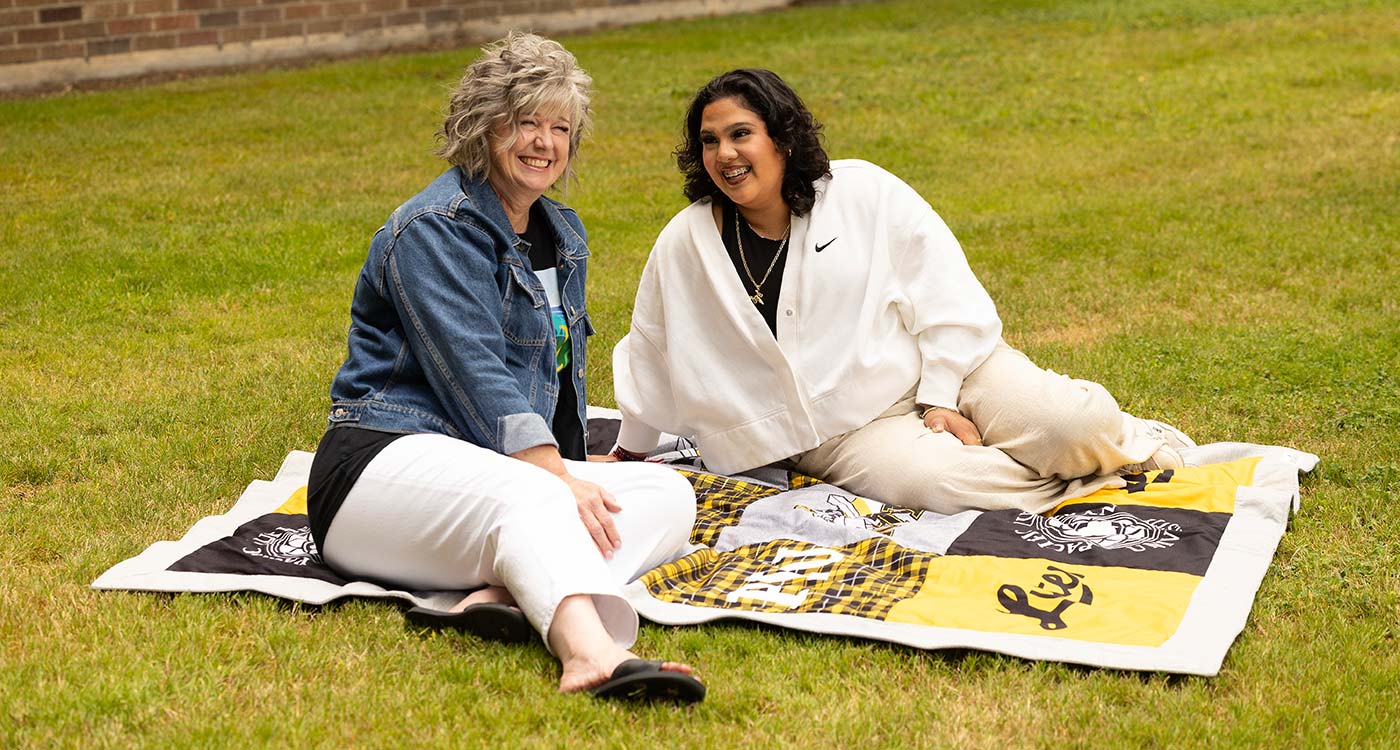
Throughout my time at PLU, I received support from WSR and also worked in a lot of different positions within WSR. I was a wellness coordinator, I helped out in the food pantry, I was a technology intern, and a Title IX intern. Through all of these experiences, I learned communication techniques, how to be a better listener, and how to hold space for people during a crisis. I was also connected to more opportunities outside of WSR and PLU, like job and life opportunities. I had networked enough in WSR and PLU to establish myself in a city other than my hometown.
WSR means more to me than just the support I received or the jobs I held. It’s where I built real relationships. I made some amazing friendships there — people who were there for me on the hard days and taught me a lot about myself.
Looking back, cancer changed my life and how I see everything. During a particularly rough patch at the hospital, I had a dream where I was sitting on a bench talking with my brother, who passed away when I was in high school. I didn’t want to leave that bench, it felt so serene, but I came back for those who were present and there for me. I touched death, and I made it through. Going through all this gave me more confidence as I move through life.
Now I try to live life in its little moments. Before, I didn’t give myself credit and would often compare myself to others. Now, I celebrate my achievements (even the little ones) and say, “I did that.” I go to the gym. I color. I paint. I cook my mom’s recipes (it never turns out like hers, but I’m getting better). I scrapbook. I hike. I give myself grace always, and I never compare myself to others, all of which Susan taught me.
Through all of this, I graduated on time in spring with a degree in criminal justice, but it still hasn’t hit me yet. I think it’s because I’m still here at PLU. In a full-circle moment, I’m working as a student advisor in the office where I first learned about WSR after my cancer diagnosis. Now, I get to help students who are starting their journeys here at PLU!
Having cancer taught me so much, and because of what I’ve been through, I feel like I can handle whatever life throws at me. I’m so ready.
If I could give advice to new Lutes, or really anyone, it’s this: Use the resources available to you. Ask for help if you need it. Don’t try to do everything on your own. Don’t compare yourself to others. And give yourself grace! I promise you’ve got this.



